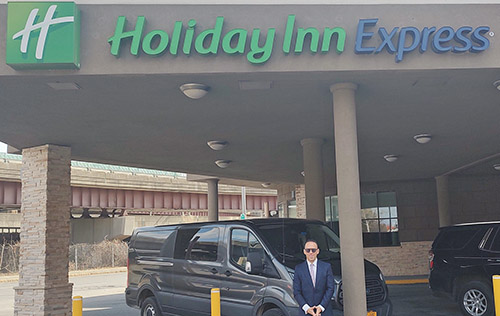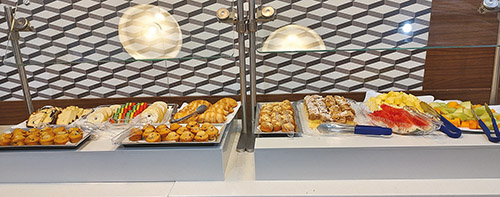
In New England and New York State there are only a smattering of kosher hotels, mainly located in Borough Park in Brooklyn as well as Tannersville and Kerhonkson, both at the foothills of the Catskill Mountains. There is also a kosher hotel in Stamford, Connecticut.
The Holiday Inn Express in downtown Albany can now be added to that list, as it has been transformed into a kosher hotel. The owner, Morris Oiring, 45, grew up in Borough Park and in Manhattan’s Hell’s Kitchen. He now lives in the affluent Nassau County village of Hewlett Harbor. He is the owner of an adult day care facility, Genesis Adult Day Care, where he serves as CEO, and Pleet Home Care, where he serves as the chief operating officer; the facility is located in western New York, with a presence in 51 counties across the state, according to Oiring.
Since February, the second month after opening the Holiday Inn Express, he has been making a profit, Oiring, a frum Jew, said. “I’m getting into the hotel business to be able to really provide the premier service at IHG prices. It’s important to us to give them a better experience. We’re bringing people together. We’re not reinventing the wheel. We look at market trends. The learning curve was quite challenging because it’s a different set of metrics. We’re helping people, but in a different way. I know the people business. I don’t know the hotel business. I’m still learning.”

Oiring officially acquired the 135-room property at auction and closed on the property January 6. It is considered to be a two-star hotel with a four-star online rating for quality service and hospitality. The hotel is located at 300 Broadway in a rundown area of Albany near the I-787 interchange known as the “parking lot district.” The area is expected to go through a gentrification over the next decade and be renamed “Liberty Park.” Some of the oldest buildings, dating back more than 200 years, are located in this section of the city.
“It cost me a lot more than I expected to get into this,” Oiring told The Jewish Link. “There were other people who originally had that shared vision. When we stepped into it, they decided it wasn’t their vision. I’m stuck there. Baruch Hashem, we went to a couple of Chabad rabbis to say a bracha. We went to the Ohel.”
The property, which suffered a bit of deterioration, became available when the previous owners declared bankruptcy. “Prior to foreclosure, they [the previous owners] were required to do what is called a P.I.P., property improvement plan. The former owners put in $2.5 million. We are now benefitting from a $2.5 million capital improvement cost.”
The hotel abuts the Greyhound Bus Terminal, considered an eyesore by many Albany residents. The Trailways Bus Terminal was kicked out last year from the shared space at the Greyhound terminal and relocated to a trailer a couple of blocks away. Albany city officials have high hopes for redeveloping the area.

“After we signed the contract, 48 hours later the city announced the largest development in the area in Albany history,” said Oiring. “Albany city officials are determined to make this a central area. Knowing what happened with the Barclay Center [in Brooklyn], they are determined to make this a central area, just like in Buffalo. You follow 868 units of retail and apartment space, 23,000 square feet of retail space next to the largest transit hub ever created in Albany.”
The redevelopment Oiring speaks of is an $81 million transit center that is the brainchild of the Albany Parking Authority and endorsed by the mayor of Albany. The new transit center is expected to become a seven-story building with six floors of parking accommodating 1,000 cars. The center’s loading platforms would serve up to nine city bus routes and up to five intercity carriers at a time. The building would include storefronts and docking space for bike-share programs, among other facilities.
Currently, the view from the rooms of the Holiday Inn Express is of the hotel parking lot and the roof of the Greyhound bus terminal. “We’re going to do shaded glass to obscure the view,” Oiring said. “In the future it’s going to be a transit hub. While it’s evolving, you’re going to be looking at the roof of a Greyhound bus terminal.”
One stumbling block that will add to the timeline is the problem that neither the city nor the parking authority owns the land on which the new buildings would be constructed. This potential snag could make the process a lengthy one to take ownership of nearby parcels of land. The hotel is located on the eastern end of the redevelopment and two blocks from the 17,000-seat MVP Arena. The state capital is less than one mile away.

The Breakfast Offering
The breakfast served at the hotel is a continental style, no hot food such as scrambled eggs or waffles. Dry cereal is provided but the milk is not Pas Yisroel or Cholov Yisroel. Oiring is working on improving that.
“Cholov Yisroel, we’re working on bringing in the milk from Monroe, Orange County, weekly,” he said. “The folks we are targeting are Jews because we are one nation. Bringing people together in a place that means something.”

If guests want to eat non-kosher food they are confined to the common areas or their hotel room. The breakfast area is cleaned and the doors are locked after breakfast hours are over.
“We’re a kosher hotel but you’re not mandated to eat kosher,” Oiring said. “If you want UberEats, we’ll get it for you. You decide. Kosher is segregated to the breakfast nook area. The guests can eat non-kosher food in the common areas. We offer everything you need, pretty much.”
Breakfast Israeli-style is Oiring’s goal, eventually. “We believe, like in Israel, all the breakfasts in the hotels are huge. That’s the best meal of the day when you go to any hotel in Israel. So, to follow that mantra, the Jewish mantra.”
Oiring has a special connection with David Greenfield, the head of Met Council and a former member of the New York City Council. Both of their mothers knew each other when they lived in Israel.

Oiring said: “His [Greenfield’s] brother, Chaim, will be doing the food services here very soon to help us reduce our hard costs. We have to focus on how to make money. We’re making the dining room kosher. It will serve 300 people from a meat kitchen. We’re going to start doing bar mitzvahs, bat mitzvahs.”
Recently Albany’s daily newspaper featured a headline crowing about a kosher restaurant that will be open to the public in the social hall that will double as a conference center. Sources close to hotel management told The Jewish Link that nothing is further from the truth. A restaurant is not in the works. Amtrak officials will be holding a training session in the conference room this month. When city officials read the story they called the hotel, upset about the headline. Hotel management put an end to that possibility, which would include several city permits and authorizations that were not approved, and hotel management had not notified city officials about the future action.
“Restaurants don’t make it due to the sheer cost of the infrastructure,” Oiring said.
Currently, the kosher supervision is under the auspices of the Vaad HaKashruth of the Capital District run by Rabbi Dr. Moshe Bomzer. The food is pre-packaged and provided by 518kosher.
The hotel is transitioning to be under Satmar kosher supervision.
“We’ve engaged leadership in Satmar,” said Oiring. “Recently one of their head guys, Rabbi Simcha Bernath, told me I didn’t even know they were up here. He stayed in the hotel. He told me: ‘I want to thank you for how nice it was. Are you making any money?’ That was the question because he actually cared. We are making money now compared to where we were due to our marketing efforts and speaking to all these groups. Now it’s about making common sense decisions.”
Looking Towards the Future
While this planned redevelopment takes shape and progresses, Oiring has big plans of his own that will have immediate results, and some long-term goals.
“All this will be redone,” Oiring said, pointing to the common area on the first floor. “The success of successful hotels is when you go to the bathrooms on the first floor, is it clean? If the bathrooms are clean, the rooms are clean. That was our goal.”
The proprietor wants the hotel to be a mirror image of who he is, enjoying the finer amenities in life. “When I saw the rooms here for the first time, I was blown away,” Oiring said. “How nice it was. Clean, bright colors. We’re going to focus on the music and put in a red carpet when you walk in, like the Fontainebleau in Miami Beach,” Oiring said. “When people walk in, they want to feel like they are at home. It’s a nice feeling. Small touches. When you look at these big global organizations, prior to being bigger, they became specialty places. We’re one of many. What makes us different, we care about people.”
“I want to create a place where people come together. We are unionized. We are a union shop through the Hotel and Gaming Trades Council, AFL-CIO. We play by the rules. It’s the right thing to do. Everyone has a vested interest in our success. As we do better, we give them more through their contract,” Oiring said. “The coach for the NCAA college teams was here [during the MAAC tournament at the MVP Arena]. Occupancy, Baruch Hashem, now that the legislature is here [in session], we’re running full. The wrestling match here, we were sold out. Black, Puerto Rican, Latino, Asian Caucus [annual soiree] sold out. We have insurance companies coming into Albany and staying with us.”
The future for Oiring means expansion and creating a mood, an atmosphere, to counter the image of the rundown area.
“We want to focus on the future and where we’re going. This is where we are focused on: convention space, hosting events. We’re focused on growing the scope. This lawyer said to me, ‘We were just talking about where we should locate our law firm.’ That means we have to talk to all the law firms in Albany. Let them know we exist.”
Oiring plans for the growth to begin later this spring. The Jewish holidays are expected to be a boon for the ambitious entrepreneur and the Holiday Inn Express.
“We’re going to do a Shavuos program [May 25], a Rosh Hashanah program. People want to go somewhere. Next year we’ll have Pesach at the hotel,” Oiring predicted. “We’re going to see how the Shavuos program goes. We’re going to see how many people come.”
The summer is expected to be brisk due to Oiring’s marketing efforts.
“This place will bring people together. The camps are looking for spaces. We want to address that issue. A camp wants to put kids someplace, put them here,” Oiring said. “Camps, Jewish camps, have nowhere to put people. A Chabad camp from Washington will potentially stay here for three weeks to a month this summer. Let them enjoy the place. We have the pool, two Jacuzzis; they can do what they want.”
For the state legislators, business clientele and other guests having a reason to congregate in the common area, it is important to have alcohol on the premises, especially when hosting simchas.
“We would love to have a bar here. We applied for a liquor license. We engage people. It’s a simcha. I could see it now. You employ local people. You have music nights,” Oiring said.
“When people order vodka, Grey Goose or Ketel One, they say, ‘Whatever you got, you got.’ I met a guy on a plane who had the trademark for the Elvis Presley brand. You have to focus on these little things. You do branding. You create your own brand of liquor. You have to do electronic dispensers so you measure exactly what you give the customers. That’s where they make their money.”
Having the appropriate locks that can be used on Shabbos and Yom Tov has always been a challenge when flipping a hotel to being under strict kosher supervision hosting events for frum Jews. Oiring has dedicated the second floor with 41 rooms for the non-electronic room entry system so guests don’t have to leave their doors open as an alternative. There is also no eruv in the downtown Albany area.
“If we know more than 41 rooms are being filled then we do more keys. I can’t see us being sold out. It would be nice if we were and it could be,” Oiring said.
The longer-term growth will include “charging stations so people can charge their cars to promote clean air emissions. It’s important to the state. We want to do solar panels on the roof to reduce our impact on the environment. We’re looking to bring in LED lighting to the whole building to brighten the place up. We want to pipe in music throughout the building,” Oiring said. “Really to continue to grow out the weekend experience adding a spa, a couple’s retreat. That way couples have a place to go. We have an indoor pool. It’s cold outside. You have to go somewhere.”
Besides filling in gaps Oiring is looking to merge his experience in health care with the hospitality industry.
“My thought was to go to an urgent care group, like Albany MD. They want to do aqua therapy. How do I know? I’m in health care. I’m in their business. That’s the highest reimbursement for them,” Oiring said proudly. “You fix it [the pool and jacuzzi need to be repaired]. You rent the space. They said, not a bad idea. They came down. Why? Because of shared costs. If they have to do a build-out it will cost them and take them at least two years. One million dollars to build out, plus a 30-year lease. We’re giving them their build-out. We have segregated areas because it’s physical therapy. We’re promoting health, wellness and yoga.”
Oiring is also reaching out to financial services and convenience companies.
“We’re looking to work with Avis and FedEx to do a kiosk center. I spoke to [banks] to put an ATM here. When you look at why you have an ATM in a CVS, it’s because they want the foot traffic. They got money, they spend money when they see something. It’s a safe area to withdraw money. No one is smashing windows or busting down doors like they do with [a standalone] bank to gain access to their ATMs. So, to bring in an ATM, it’s a centralization point with other key institutions.”
Holocaust Museum Planned
The biggest change is the plan to create a Holocaust museum in downtown Albany. The brainchild behind this effort is Rabbi Sholom Friedmann, director of the Brooklyn-based Amud Aish Memorial Museum.
“That would be important to me,” said Oiring. “He’s building it here. We’re giving him space on the site to do a Holocaust Museum here. They are going to pick a common space of about 500 square feet. We don’t have to give them a huge space. They build out wherever they build out. Then we will have a separate entrance just to see that area so it doesn’t interfere with the day-to-day operations of the hotel. You never want a guest to wonder who all these people are. Our guests want to come and they want to go. They don’t want to see people walking all over the place. …
“Students from SUNY should know what really happened [during the Holocaust]. Nobody knows.”
Oiring wants to hear the good, the bad and the ugly from the guests at the hotel. “Every hotel guest gets a customer service survey. We want to know what you are thinking. “If you’re happy, you’re coming back. We want to do the best job humanly possible here.”
By Marc Gronich










